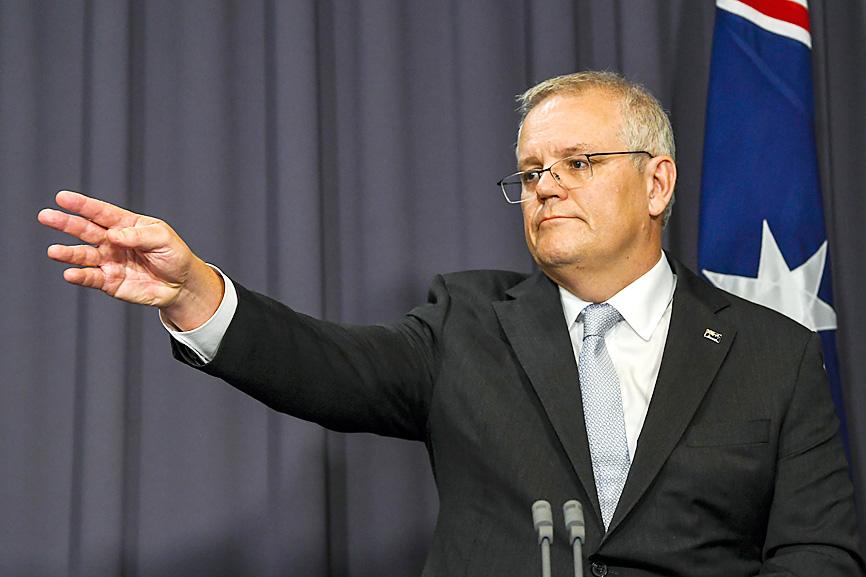The Australian parliament yesterday passed legislation setting a framework for developing offshore wind farms and transmission lines, in a big boost to several multibillion-dollar proposed projects as the country looks to replace coal-fired power.
Projects that have been awaiting the new laws include the 2.2 gigawatt Star of the South wind project off the coast of Victoria, and Sun Cable, which plans to deliver solar power via an undersea cable from the Northern Territory to Singapore.
“The [Australian Prime Minister Scott] Morrison Government’s offshore electricity infrastructure package will unlock development of a new industry that will create thousands of skilled regional jobs, strengthen our economy, and support a more affordable and secure energy system,” Australian Minister for Industry, Energy and Emissions Reduction Angus Taylor said in a statement.

Photo: AP
Star of the South, the most advanced offshore wind project in the works, said modeling showed it could create 3,000 direct jobs.
The project is led by Copenhagen Infrastructure Partners.
Star of the South CEO Casper Frost Thorhauge welcomed the passage of the legislation and said he looked forward to working on detailed regulations needed for projects to go ahead.
Locations identified by Australia’s energy market operator as ideal for offshore wind farms happen to be near industrial hubs that currently rely on coal-fired power, such as the Hunter Valley in New South Wales and Gippsland in Victoria.
The Victoria state government on Tuesday announced A$40 million (US$28.8 million) in funding for three offshore wind project developers — Star of the South, Macquarie Group Ltd and Flotation Energy PLC.
Research group Beyond Zero Emissions estimates offshore wind could provide the energy needed for green steel and aluminum, hydrogen and ammonia production, which could help generate A$333 billion in green exports by 2050.
“Offshore wind is the key that will unlock the industrial future of regional Australia,” Beyond Zero Emissions head of policy Tom Quinn said in a statement.

GROWING OWINGS: While Luxembourg and China swapped the top three spots, the US continued to be the largest exposure for Taiwan for the 41st consecutive quarter The US remained the largest debtor nation to Taiwan’s banking sector for the 41st consecutive quarter at the end of September, after local banks’ exposure to the US market rose more than 2 percent from three months earlier, the central bank said. Exposure to the US increased to US$198.896 billion, up US$4.026 billion, or 2.07 percent, from US$194.87 billion in the previous quarter, data released by the central bank showed on Friday. Of the increase, about US$1.4 billion came from banks’ investments in securitized products and interbank loans in the US, while another US$2.6 billion stemmed from trust assets, including mutual funds,

Micron Memory Taiwan Co (台灣美光), a subsidiary of US memorychip maker Micron Technology Inc, has been granted a NT$4.7 billion (US$149.5 million) subsidy under the Ministry of Economic Affairs A+ Corporate Innovation and R&D Enhancement program, the ministry said yesterday. The US memorychip maker’s program aims to back the development of high-performance and high-bandwidth memory chips with a total budget of NT$11.75 billion, the ministry said. Aside from the government funding, Micron is to inject the remaining investment of NT$7.06 billion as the company applied to participate the government’s Global Innovation Partnership Program to deepen technology cooperation, a ministry official told the

Taiwan Semiconductor Manufacturing Co (TSMC, 台積電), the world’s leading advanced chipmaker, officially began volume production of its 2-nanometer chips in the fourth quarter of this year, according to a recent update on the company’s Web site. The low-key announcement confirms that TSMC, the go-to chipmaker for artificial intelligence (AI) hardware providers Nvidia Corp and iPhone maker Apple Inc, met its original roadmap for the next-generation technology. Production is currently centered at Fab 22 in Kaohsiung, utilizing the company’s first-generation nanosheet transistor technology. The new architecture achieves “full-node strides in performance and power consumption,” TSMC said. The company described the 2nm process as

Even as the US is embarked on a bitter rivalry with China over the deployment of artificial intelligence (AI), Chinese technology is quietly making inroads into the US market. Despite considerable geopolitical tensions, Chinese open-source AI models are winning over a growing number of programmers and companies in the US. These are different from the closed generative AI models that have become household names — ChatGPT-maker OpenAI or Google’s Gemini — whose inner workings are fiercely protected. In contrast, “open” models offered by many Chinese rivals, from Alibaba (阿里巴巴) to DeepSeek (深度求索), allow programmers to customize parts of the software to suit their